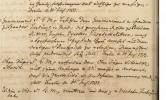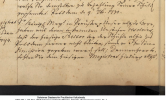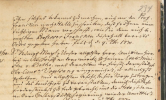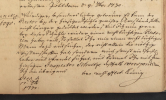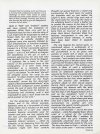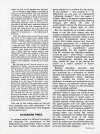During my postings on Doris Ritter last year, I mentioned that the Prussian State Archive had a beta version of a new online site with an index to the collected daily edicts of King Friedrich Wilhelm I. That site is now finally open, complete with scans of the actual books in which copies of the edicts were noted down by the King's secretaries. Here is the link if anybody wants to do some archival research of their own:

friedrich-wilhelm-digital.de
The time covered by the site is very narrow, currently going from 1728 (when the King's edicts were for the first time formally collected for posterity) to 1733 -- later volumes to be added as and when the Archives get around to it. Handily, this exactly covers the period from Doris Ritter's arrest and flogging in September 1730 to her release from Spandau
Spinnhaus in July 1733. Despite the short time period covered, the sheer number of edicts is overwhelming and gives a good impression at just how busy an early 18th century German ruler was micro-managing the high and low affairs of his state -- he was issuing edicts pretty much every day, even when travelling, and often dozens of them on a single day, adding up to 35,782 entries in the five years currently covered by the site, an average of about 20 per day.
As I said in my first post quoted above, the index shows only one edict specifically mentioning Doris Ritter by name. The actual edicts ordering her to be arrested, and to be flogged a few days later, are not included even though they have been in the public domain from other sources for almost 200 years . This is presumably because documents relating to the Katte scandal and subsequent trial were considered to be far too politically sensitive to be included in the normal administrative records and were instead kept in secret files (which we know to have been edited and partially destroyed by Friedrich II once he came to the throne in 1740).
The one edict on Doris Ritter that is in the newly opened archive of royal edicts is her pardon and release from the
Spinnhaus, dated 11 July 1733. Here is the scan:
View attachment 1107733
This is actually a longer text than I was expecting: her biographer said that Doris's father petitioned the King in 1733 (after the reconciliation between King and Crown Prince) to ask for her release, and he approved it by scribbling the single word "good" on the petition. The above entry would presumably be what the royal secretaries prepared to translate that one word decision into an order to be sent to the governor of the
Spinnhaus. Unfortunately, my ability to read 18th century handwriting is not great -- what I can make out is roughly:
"To the Government at Spandau: His Royal Majesty orders the Government at Spandau in respect of (...) the former rector at Potsdam, Ritter's daughter (?), Dorothee Elisabeth Ritter, after swearing Urfehde to be released from her arrest at the Spinnhaus there, in that she shall be pardoned. Berlin, 11 July 1733"
There are several words that I cannot make out and I am not sure whether they add anything substantial to this. No mention of the cause for the original arrest, or any "Farewell" on release. The reference to "
Urfehde" is an oath that offenders were made to swear to the effect that they will not re-offend, will comply with certain conditions of release (e.g. not enter the territory if they have been banished) and will not seek to revenge themselves on any officials, judges or witnesses, on pain of punishment for perjury (a capital offence). Basically, this was an early form of probation or parole. The fact that Doris was made to swear this makes it clear that this was something less than a full pardon and in particular did not clear her name or declare her innocent of the original charges. We know that after release from Spandau she was living with her family in the town of Neubrandenburg in Mecklenburg, i.e. outside the Kingdom of Prussia, and she did not return to Prussia until after the King's death in 1740. It is not clear whether her leaving the country was one of the conditions of her parole.
There are three other edicts related to Doris, although none of them mentions her name:
1. On 9 November 1929, the King wrote to the Potsdam Magistrate to ask them to appoint a new "rector, co-rector and cantor" for the Town School on recommendation from Professor Francke, the head of the theological faculty at the University of Halle. The edict is hard to read but appears to give details of the appointment process and says that the candidate was to be examined and that there was a probation period. In the event, the post went to Doris's father, although his name is not in the edict. This is what got Doris to Potsdam in the first place, with her family.
View attachment 1107843
2. On 9 September 1730, two days after Doris's flogging which took place on 7 September, the King wrote another edict to the Potsdam Magistrate, dismissing Doris's father from the post of rector and cantor. I had already posted this edict previously as a copy was kept in the Potsdam town archives and transcribed for the Wegener paper in the 1860s. The text is:
"His Royal Majesty in Prussia etc. Our gracious Lord has for the known reasons decided that the rector here of the school here at Potsdam is to be dismissed; Therefore direct the magistrate herewith to make this known to him, and also to write to Professor Francke at Halle that he shall send you a suitable man, as you have already sent order to Professor Francke to that effect.
Potsdam, the 9th September 1730"
As far as I can decipher it, the text of the hand-written edict appears to be word-for-word identical to the transcription in the Wegener paper. The wording neither says what the "known reasons" are (we know it was the arrest and shameful punishment of his daughter) nor gives his name, just his position.
View attachment 1107845View attachment 1107846
3. The following day, 10 September 1730, the King writes to Professor Francke asking him to recommend a new rector to replace the old one who "can no longer be tolerated because of certain circumstances". Again, the reasons for the dismissal are not explicitly recorded, which suggests notwithstanding the very public manner of her flogging, the King didn't want to make the events surrounding her arrest and punishment a matter of public record -- as I have previously said, it is remarkable (and frustrating) that the King was happy to order her to be flogged but never put in writing what she was actually accused of. I cannot read everything in this edict, but it seems to be more concerned with the required qualifications and qualities of the incoming rector than with the events that led to the dismissal of the outgoing one.
View attachment 1107847



